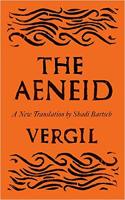
Profile Books (2020) h/b 400pp £16.99 (ISBN 9781788162678)
Successful translations of poetry need more than linguistic accuracy and metrical proficiency. Above all, they require a poetic instinct. In our review of Virgil and his Translators (14 March 2019), we noted Susanna Braund’s assessment of recent translations of the Aeneid. She particularly praised Robert Fitzgerald (1981) and Sarah Ruden (2008), who both use a modernised iambic pentameter with heightened language. Fitzgerald draws out the nuances of the Latin at greater length. Ruden’s poetry is ‘more spare and muscular with the same number of lines as the original Latin’.
B.’s new translation has been praised by an American professor as ‘probably the best version of the Aeneid in modern English’. Pacy and often colloquial, with occasional italics for emphasis, much of it reads like prose. A passage in 11.85-88 illustrates the differing treatments:
ducitur infelix aevo confectus Acoetes,
pectora nunc foedans pugnis, nunc unguibus ora,
sternitur et toto proiectus corpore terrae.
ducunt et Rutulo perfusos sanguine currus.
Virgil’s writing is rhythmical and precise. Each line is self-contained and paints a compelling picture. Fitzgerald illuminates the Latin with rhetorical grandeur, but needs five lines to Virgil’s four and sacrifices architectural precision:
‘Acoetes had to be led, far gone in age
And misery, his breast stung by his blows,
His cheeks torn by his nails; at times he fell,
Full-length, flinging himself to earth. War cars
They also led, a-glisten with Rutulian blood.’
Ruden faithfully reflects Virgil’s architecture, meaning and musicality. She reverses the sequence of the second line to achieve a stronger rhythm, while maintaining the pathos of the Latin throughout:
‘Men led along Acoetes, wrecked by old age.
He clawed his face and bruised his chest with pounding
And then fell forward, sprawling, on the earth.
Rutulian chariots filed by, soaked in blood.’
B., eschewing initial upper-case letters, translates:
‘Wretched Acoetes, weak with age, was led
along. He beat his chest with fists and clawed his face,
falling prostrate on the ground. Next came chariots
spattered with Rutulian blood [and Pallas’ warhorse … ]’
The enjambment of ‘led / along’ is jarring. It distorts Virgil’s architecture and leads to the unidiomatic two-syllable expression ‘with fists’. Nor does B.’s ‘falling prostrate on the ground’ do justice to sternitur et toto proiectus corpore terrae. B. reduces Virgil’s four lines to three and a half before her text merges mid-line into a new period.
Enjambment and compression pervade B’s translation. iamque faces et saxa volant, furor arma ministrat (1.149-50), translated by Ruden as ‘Torches and stones fly, frenzy finds its weapons’, becomes in B.:
‘rocks and
firebrands fly, the weapons rage supplies.’
The reader is left to determine whether the last two words are nouns or verbs.
Similarly,
instar montis equum divina Palladis arte
aedificant’ (2.15-16)
‘They built a giant horse with the help of Pallas’
skill’.
The apostrophe after Pallas does not help to elucidate poetry intended for recital. ‘Skill’ is orphaned. The Latin instar montis and divina are lost. The final possessive apostrophe before enjambment reoccurs in: hic Dolopum manus, hic saevus tendebat Achilles (2.29), which becomes:
Here, there’d been Dolopians and cruel Achilles’
tent’.
Such preferences give this result as Dido’s story reaches its climax (4.296-300):
at regina dolos (quis fallere possit amantem?)
praesensit, motusque excepit prima futuros
omnia tuta timens. eadem impia Fama furenti
detulit armari classem cursumque parari.
‘But Dido sensed the trick (who can deceive
a lover?) and the launch they planned. Now everything
seemed suspect, even if it wasn’t. That same impious
Rumor told the desperate queen the fleet prepared
to sail.’
Here, motusque excepit prima futuros surely means ‘she was the first to get wind of his future movements’; armari is omitted, as is the English ‘that’, which elegance demands be inserted after ‘queen’.
Generally, B.’s translation is accurate, but there are lapses, e.g. quattuor a stabulis praestanti corpore tauros (8.207) become ‘seven perfect bulls’.
B.’s Aeneid begins with a helpful ‘Map of Aeneas’ Wanderings’, but the journey past Palinurus, where Virgil’s story is an apologia for Octavian’s naval defeat of 36 BC, is omitted. There is a 34-page ‘Introduction to the Poem’, which includes useful comments on the plot, the nature of the Augustan epic, Aeneas’s character and story, and thoughts on memory and empire. A ten-page ‘Translator’s Note’ follows, in which B. explains her choices. The end-matter includes brief notes, a bibliography of works cited in the Introduction and Notes, and a Glossary of proper names with the first citation. Thus, Palinurus’s mention in 3.202 is noted (as 3.201), but not his loss at sea (5.827-871), or appearance in the Underworld (6.337-83).
B.’s book is now offered on Amazon at a reduced price of £12.85. A revised paperback edition of Ruden is due out on 23 March priced at £12.99. Readers are advised to wait before making their choice.
Stuart Lyons
The reviewer was awarded the Stephen Spender Prize 2020 for poetry in translation.
